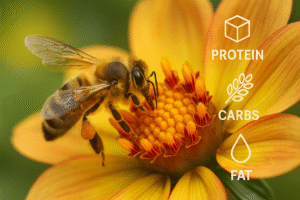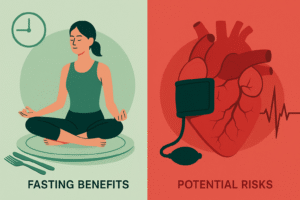You’re Not Just What You Eat—You’re What Your Microbes Eat
Fun fact: You have more microbial cells in your gut than human cells in your entire body.
That’s right—when you sit down to eat, you’re not just feeding yourself. You’re feeding trillions of invisible dinner guests living inside you. Welcome to the wild, microscopic world of your gut microbiome.
We’ve all heard the phrase “You are what you eat.” But science is now rewriting that adage. Emerging research suggests that your health, mood, weight, and even risk of chronic disease may depend more on what your gut microbes prefer than on what you personally crave.
Let’s unpack why your gut bugs matter, what they’re hungry for, and how your diet could be making them either your best health allies—or your worst enemies.
Meet Your Microbial Co-Pilot
Your gut microbiome is the community of bacteria, fungi, viruses, and other microorganisms living in your digestive tract. Think of it as a bustling ecosystem that weighs about as much as your brain and has a say in everything from digestion to immunity.
Many of these microbes are beneficial. They help break down complex food components, produce vitamins like vitamin K and vitamin B12, regulate your immune system, and even communicate with your brain via the gut-brain axis (the two-way biochemical signalling between the gastrointestinal tract and the central nervous system).
But not all microbes are created equal. Your gut is a competitive zone where “good” and “bad” bacteria constantly battle for dominance. What tips the balance? Often, it’s your diet.
Your Microbes Have Preferences (And They’re Picky)
Here’s the catch: your microbes don’t all like the same foods you do. That ice cream sundae might make you happy—but your gut microbes may not be as thrilled.
Different foods feed different microbes. Fibre-rich veggies, whole grains, and legumes feed helpful bacteria like Bifidobacteria and Lactobacillus, which produce short-chain fatty acids (SCFAs) that reduce inflammation and nourish your gut lining.
On the other hand, a diet high in ultra-processed foods, sugar, and red meat can feed harmful bacteria that produce toxic byproducts and raise your chances of developing conditions such as obesity, type 2 diabetes, and even depression.
Think of it this way: a doughnut fuels one kind of gut ecosystem. Broccoli fuels another. And the one you feed more often? That’s the one that grows stronger.
The Fibre Crisis: Why Your Microbes Are Starving
Despite fibre being critical for microbial health, most people in India (and around the world) don’t get enough of it. Our ancestors consumed 100+ grams of fibre a day. Today, many of us barely reach 15 grams.
This lack of dietary fibre means your gut microbes are literally starving. When they don’t get the complex carbs they need, they turn to your gut lining for sustenance. That’s right—microbes can start eating away at your intestinal mucus barrier, leading to leaky gut syndrome, inflammation, and increased disease risk.
Foods that nourish your microbiome include:
- Whole grains like brown rice, barley, and millets
- Pulses and legumes (dal, chickpeas, kidney beans)
- Leafy greens (spinach, methi, amaranth)
- Fermented foods (curd, idli, dosa, pickles)
- Fruits like bananas, apples, and papaya

The Microbiome-Mood Connection
Your gut isn’t just digesting food. It’s producing neurotransmitters like serotonin, dopamine, and GABA (gamma-aminobutyric acid)—chemicals that directly affect your mood and mental health.
In fact, over 90% of serotonin, the “feel-good” hormone, is made in your gut. So if your gut is inflamed or imbalanced, your mental well-being might be too.
A recent study from Harvard Medical School found that people with more diverse gut microbiomes reported better mood stability, fewer anxiety symptoms, and improved focus.
From Gut to Globe: The Microbiome and Indian Diets
India’s traditional dietary wisdom—dal-chawal, seasonal fruits, sabzi, and homemade fermented pickles—is naturally microbiome-friendly. But as urban diets shift towards packaged snacks, sugary drinks, and fast food, we’re witnessing a rise in gut-related disorders like IBS (Irritable Bowel Syndrome), food intolerances, and autoimmune diseases.
Even antibiotics, which are often over-prescribed in India, can wipe out your microbial diversity, sometimes permanently. And it’s not just pills—antibiotic residues in meat and milk can also disrupt your gut flora.
Case Study: Two Diets, Two Microbiomes
In a well-known experiment, researchers from Stanford University School of Medicine took two identical twins and gave them different diets—one plant-based and the other heavy in meat, dairy, and processed foods.
After just two weeks, the twin on the plant-based diet showed increased microbial diversity, better markers of inflammation, and improved gut health. The other twin? Increased gut permeability and spikes in harmful bacteria.
This suggests that even short-term dietary shifts can drastically affect your gut ecosystem.
Probiotics, Prebiotics, and the Hype
Supermarkets today are flooded with probiotic products—yogurts, pills, drinks. But are they really useful?
Probiotics (live beneficial bacteria) can help, but only if they reach the gut alive—and not all do. More importantly, they need the right kind of food—prebiotics—to thrive. Prebiotics are non-digestible fibres that act as fuel for probiotics.
The most effective strategy? Don’t rely on pills. Eat a diverse, fibre-rich diet with occasional fermented foods. Nature already built the perfect supplement shelf—it’s called your local sabzi mandi.
Conclusion: Feed Them Well, Heal Yourself
You are what your microbes eat. And what they eat determines how well your body fights off disease, handles stress, and even how clearly you think.
In a way, every meal is a vote for the kind of gut—and life—you want to have. If you feed junk to your microbes, they’ll reward you with inflammation, brain fog, and fatigue. But if you nourish them with fibre, diversity, and fermented goodness, they’ll become your strongest allies in health.
So the next time you sit down to eat, ask yourself: am I eating for me, or for us?
Author’s Note
As research evolves, we’re only just beginning to understand the gut’s full influence on our health. But one thing’s clear: honouring your microbes is no longer just a wellness trend—it’s a personal revolution. Start small. Eat real. Your body (and bugs) will thank you.
G.C., Ecosociosphere contributor.
References and Further Reading
- Harvard Health Blog: The Gut-Brain Connection
- Stanford Medicine Microbiome Research
- 15 of the Best Foods for Gut Health—Senior Edition – Boomer Central. https://boomercentral.com/best-foods-for-gut-health/
- Gut Health and Hormones: The Intricate Connection – Academic Insights. https://academicinsights.org/2025/01/05/gut-health-and-hormones-the-intricate-connection/
- Menopause & the gut-brain axis – MPOWDER. https://mpowder.store/blogs/journal/menopause-the-gut-brain-axis




